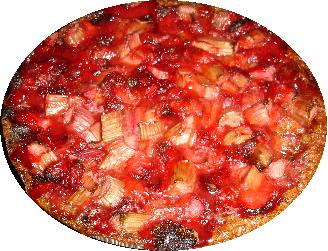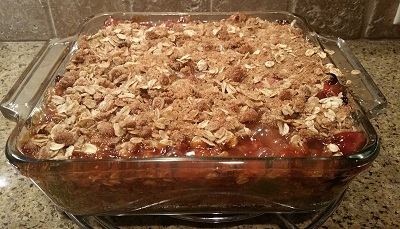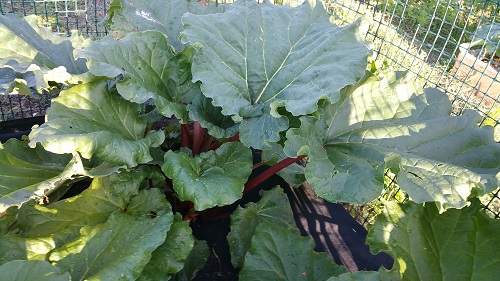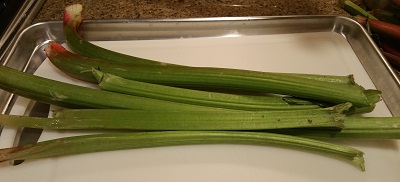
Rhubarb U-Pick Orchards or farms in Iowa in 2025, by area of state
Keep in mind, not all areas of a state have rhubarb farms that are open to the public. If you know of any others, please tell us using the add a farm form!
These are the areas of the state that have rhubarb orchards to pick rhubarb. Click on the area closet you!
Rhubarb
Rhubarb Picking Tips, Recipes and Information
Rhubarb is a cool weather crop, which appears in the late Spring. The stalks are the edible portion, never eaten raw (too acidic), but cooked and sweetened, they have a flavor much like strawberries.
The stalks that grow from energy stored in the roots the previous year are the part that is harvested. After picking stalks for a few weeks, the plants must be left for the rest of the growing season to recover and save energy for the next year.
Strawberries are usually ripe about the same time as rhubarb, and since the two flavors compliment each other so well, many recipes combine them. One thing rhubarb does not like: prolonged periods of hot, humid weather. It is really difficult to grow rhubarb in the deep South (unless you plant it as an annual, planting new roots early each Spring).
Rhubarb Recipes, Canning and Freezing Rhubarb
- How to freeze Rhubarb!
- Rhubarb-strawberry jam!
- Easy Rhubarb-Strawberry pie
-
 Rhubarb
custard pie
Rhubarb
custard pie - Rhubarb crisp
- Rhubarb festivals
Picking Rhubarb
Most people prefer smaller stems (12 inches to 18inches long. The larger, fatter stems can be tough and fibrous, which is worse during summer heat and drought.
Tips on How to Pick Rhubarb
- Pick only the best Rhubarb: Select firm stalks, nothing wilted.
- Grasp the stalk near the base of the plant
- Twist the the stalk in a rotating motion gently, but firmly until you feel; the stalk separate. Or, if the farm prefers, cut the stalks an inch or two above the base.
- Do not remove more than one third of the leaves from a plant at one time. Immediately remove the poisonous leaves from the stalk, discard them in the walkway.
Rhubarb Facts, Measurements and Tips
- Rhubarb is a fruit, not a vegetable According to a 1947 NY court!
-
Rhubarb festivals: Most areas that grow rhubarb have a
Rhubarb festival, at which you
can taste all kinds of fresh Rhubarb foods, pies, jams, cakes - and most
commonly, fresh Rhubarb shortcake. To find out where and when there
is one near you, see this
page for a list of Rhubarb festivals, sorted by state!

- Rhubarb measurements:
2 lbs. of chopped stalks is about 4 cups. - The stalks are the only edible part of the plant; in fact, the leaves of rhubarb are poisonous. The leaves contain the high concentrations of oxalic acid, which gives the rhubarb it's astringent taste. So don't let your children or pets eat the leaves. I usually twist the leaves off the stalk and throw them on the ground to become mulch.
- One cup of Rhubarb contains only about 50 calories
- U-pick Rhubarb are much healthier than store-bought. Consumer reports says store bought Rhubarb have so many pesticide and fungicide residues on they, that they don't recommend you eat them at all!
- Rhubarb has been used for thousands of years as a medicinal plant by the Chinese.
- Want to grow your own Rhubarb? Here's an article about how to: Rhubarb is an Excellent Fruit for the Home Garden
- See this page for many more fun and interesting Rhubarb facts, nutritional information and trivia
Before you leave to go to the farm:
- Always call before you go to the farm - Rhubarb are affected by weather (both rain and cooler temperature) more than most crops. And when they are in season, a large turnout can pick a field clean before noon, so CALL first!
- Leave early. On weekends, then fields may be picked clean by NOON!
-
Some growers furnish picking containers designed
for Rhubarb, but they may charge you for them; be sure to call before you go to see if you need to bring
containers.
Plastic dishpans make good containers. - Bring something to drink and a few snacks; you'd be surprised how you can work up a thirst and appetite! And don't forget hats and sunscreen for the sun. Bugs usually aren't a problem, but some deet might be good to bring along if it has been rainy.
When you get home
- Refrigerate, they will stay good for about a week or two, but the fresher, the better.
- Do not wash the stalks, just wrap in plastic wrap. .
- Freeze any that you do not plan to use within a week.
It is easy to blanch and freeze
rhubarb. See this page.

Growing your own Rhubarb
- Before planting, eliminate all weeds, especial persistent invasive weeds, like Bermuda grass, nutsedge, etc.
- Choose a site that is sunny, well-drained, with a loose loamy soil. Rhubarb does not like the shade nor sitting in water.
- Plant rhubarb crowns in early spring as soon as the ground can be worked.
- Some varieties of Rhubarb can be planted in the fall after they have gone dormant. (check with the nursery)
- Dig large holes and work in compost. Rhubarb plants are heavy feeders.
- Space rhubarb plants about 3 or 4 feet apart and plant the crowns 1 to 2 inches below the surface of the soil.
- Mulch with a heavy layer of straw, compost and rotted manure
- Water and weed your plant well.
- Remove seed stalks as soon as they appear.
Rhubarb Varieties
There are two common types of rhubarb, those with bright red
stalks (like Crimson Red) and those whose stalks are mostly green.
They taste about the same, but most people prefer the red. I
ahve usually
bought my crowns from Indian Berry; I've found them to be
reliable and provide large crowns. (I have no affiliation with them)
I
ahve usually
bought my crowns from Indian Berry; I've found them to be
reliable and provide large crowns. (I have no affiliation with them)
- Canada Red (extra sweet)
- Cherry Red (red inside and out)
- Crimson Red (slimmer diameter red stalks) (photo of plant above right)
- MacDonald (tender skin; bright red)
- Ruby
- Valentine (good flavor)
- Victoria (green with red tint - see photo at right)
Other Local Farm Products (Honey, Horses, Milk, Meat, Eggs, Etc.)
(NOT pick-your-own, unless they are also listed above)
- Farm markets and roadside stands
- Local Honey Finder
- Local Meat, Milk and Eggs
- Venues: Farms, Wineries, Orchards for your event, wedding or party
- Easter egg hunts
- Children"s consignment sales
- Fruit and vegetable festivals
- Winery tours and wine tastings
- Horse rides, stables, lessons, trails
- Maple Syrup farms and sugarworks
- Bed & Breakfasts on Farms, Wineries, Ranches and Orchards
- Pumpkin patches
- Corn mazes
- Zombie Paintball venues
- Christmas Tree Farms & lots
- Environmental resources
- Consumer fraud information
- Wholesale food sources
- Resources for Farmers
Looking for canning equipment and supplies?
Water bath canner with a jar rack
Pressure canners for gas, electric and induction stoves: Presto 23Qt or T-fal 22Qt
Canning scoop (this one is PERFECT)
Ball Blue book (most recent version)
Jars: 8oz canning jars for jams
Find Other types of farms:
Farm markets and roadside stands
Road trips and camping resources
Local Honey, apiaries, beekeepers
Consumer fraud and scams information
Home canning supplies at the best prices on the internet!
Maple Syrup Farms, sugarworks, maple syrup festivals
Environmental information and resources
Farms For Your Event for birthday parties, weddings, receptions, business meetings, retreats, etc.
Festivals - local fruit and vegetable festivals
Get the
most recent version of
the Ball Blue Book
With this Presto 23 quart pressure canner and pressure cooker, you can "can" everything, fruits, vegetables, jams, jellies, salsa, applesauce, pickles, even meats, soups, stews. Model 01781

You can make jams, jellies, can fruit, applesauce, salsa and pickles with water bath canners, like this Granite Ware 12-Piece Canner Kit, Jar Rack, Blancher, Colander and 5 piece Canning Tool Set

